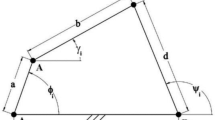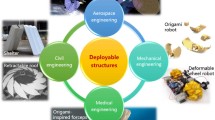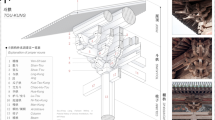Abstract
In this research, optimal synthesis of function generation of four-bar linkages is investigated using different heuristic optimization methods. The novelty of this study is that we considered the five precision point’s distribution and both stroke angles of the follower and crank links as the optimization variables. Therefore, a non-linear optimization was done with seven variables. Different optimization techniques, including heuristic and gradient based methods were used for optimization and were completely compared. Finally, general solutions were found and distribution of precision points for some desired functions was rationalized. GA-Hybrid seems to be the best method in finding global optimums in cases that the problem is sorely nonlinear, and also it is fast. Even it seems that distribution of precision points is independent of stroke angles of the follower and crank links. Some precision points are out of the design domain, and they are sorted in a way that they can describe the behavior of desired function better.













Similar content being viewed by others
References
Freudenstein F (1959) Structural error analysis in plane kinematic synthesis. J Eng Ind Trans ASME 81:15–22
Alizade RA, Freudenstein F, Pamidi PR (1976) Optimum path generation by means of the skew four-bar linkage. Mech Mach Theory 11:295–302
Sutherland GH, Sidall JN (1974) Dimensional synthesis of linkages by multifactor optimization. Mech Mach Theory 9:81–95
Simionescu PA, Beale D (2002) Optimum synthesis of the four-bar function generator in its symmetric embodiment: the Ackermann steering linkage. Mech Mach Theory 37:1487–1504
Mariappan J, Krishnamurty S (1996) A generalized exact gradient method for mechanism synthesis. Mech Mach Theory 31:413–421
Bose A, Gini M, Riley D (1997) A case-based approach to planar linkage design. Artif Intell Eng 11:107–119
Hoeltzel DA, Chieng WH (1990) Pattern matching synthesis as an approach to mechanism design. J Mech Des 112:190–199
Sancibrian R, Viadero F, García P, Fernández A (2004) Gradient-based optimization of path synthesis problems in planar mechanisms. Mech Mach Theory 39:839–856
Levitskii NI, Sarkissyan YL, Gekchian GS (1972) Optimum synthesis of four-bar function generating mechanism. Mech Mach Theory 7:387–398
Rao AC (1975) Kinematic design of four-bar function generators with optimum sensitivity. Mech Mach Theory 10:531–535
Rao AC (1979) Optimum design of four-bar function generators with minimum variance criterion. J Optim Theory Appl 29:147–153
Sun W (1982) Optimum design method for four-bar function generators. J Optim Theory Appl 38:287–293
Chen FY, Chan VL (1974) Dimensional synthesis of mechanisms for function generator using Marguardt’s compromise. J Eng Ind Trans ASME 96:131–137
Guj G, Dongm ZY, Giacinto MD (1981) Dimensional synthesis of four bar linkage for function generation with velocity and acceleration constraints. Meccanica 16:210–219
Acharyya SK, Mandal M (2009) Performance of EAs for four-bar linkage synthesis. Mech Mach Theory 44:1784–1794
Kunjur A, Krishnamurty S (1995) Genetic algorithms in mechanism synthesis. In: 4th applied mechanisms and robotics conference
Roston GD, Sturges RH (1996) Genetic algorithm synthesis of four-bar mechanisms. Artif Intell Eng Des Anal Manuf 10:371–390
Shiakolas PS, Koladiya D, Kebrle J (2002) On the optimum synthesis of four-bar linkages using differential evolution and the geometric centroid of precision positions. Inverse Probl Eng 10:485–502
Lee KY, El-Sharkawi MA (2008) Modern heuristic optimization techniques: theory and applications to power systems
Cabrer JA, Simon A, Prado M (2002) Optimal synthesis of mechanisms with genetic algorithms. Mech Mach Theory 37:1165–1177
Bulatović RR, Dordević SR (2009) On the optimum synthesis of a four-bar linkage using differential evolution and method of variable controlled deviations. Mech Mach Theory 44:235–246
Cabrera JA, Nadal F, Muñoz JP, Simon A (2007) Multiobjective constrained optimal synthesis of planar mechanisms using a new evolutionary algorithm. Mech Mach Theory 42:791–806
Laribi MA, Mlika A, Romdhane L, Zeghloul S (2004) A combined genetic algorithm–fuzzy logic method (GA–FL) in mechanisms synthesis. Mech Mach Theory 39:717–735
Smaili A, Diab N (2007) Optimum synthesis of hybrid-task mechanisms using ant-gradient search method. Mech Mach Theory 42:115–130
Freudenstein F (1955) Approximate synthesis of four-bar linkages. Trans Am Soc Mech Eng 77:853–861
Waldron KJ, Kinzel GL (2003) Kinematics, dynamics and design of machinery. Wiley, New York
Holland JH (1975) Adaptation in natural and artificial systems, an introductory analysis with applications to biology, control, and artificial intelligence
Goldberg D (1988) Genetic algorithms. Addison-Wesley, Reading
Goldberg DE, Richardson J (1987) Genetic algorithms with sharing for multimodal function. In: Grefenstette J (ed) Optimization, proceedings of the second international conference on genetic algorithms. Erlbaum, Hillsdale, pp 41–49
Reynolds CW (1987) Flocks, herds, and schools: a distributed behavioral model. Comput Graph 21:25–34
Kennedy J, Eberhart R (1995) Particle swarm optimization. In: Proceedings of IEEE international conference on neural networks, 1942–1948
Mendes M, Kennedy J, Neves J (2004) The fully informed particle swarm: simpler, maybe better. IEEE Trans Evol Comput 8:204–210
Wilson RB (1963) A simplicial algorithm for concave programming. PhD thesis, Harvard University, Graduate School of Business Administration
Biggs MC (1975) Constrained minimization using recursive quadratic programming. In: Dixon LCW, Szergo GP (eds) Towards global optimization. North-Holland, Amsterdam, pp 341–349
Han SP (1977) A globally convergent method for nonlinear programming. J Optim Theory Appl 22:297–309. doi:10.1007/BF00932858
Powell MJD (1978) A fast algorithm for nonlinearly constrained optimization calculations. In: Watson GA (ed) Numerical analysis. Springer, Berlin, pp 144–157
Panier ER, Tits AL (1987) A superlinearly convergent feasible method for the solution of inequality constrained optimization problems. SIAM J Control Optim 25:934–950
Zhu Z (2006) A simple feasible SQP algorithm for inequality constrained optimization. Appl Math Comput 182:987–998
Kienitz J, Wetterau D (2012) Financial modeling theory, implementation and practice (with Matlab source). Wiley, UK
Shariati M, Norouzi M (2011) Optimal synthesis of function generator of four-bar linkages based on distribution of precision points. Meccanica 46:1007–1021
Author information
Authors and Affiliations
Corresponding author
Rights and permissions
About this article
Cite this article
Mirmahdi, S.H., Norouzi, M. On the comparative optimal analysis and synthesis of four-bar function generating mechanism using different heuristic methods. Meccanica 48, 1995–2006 (2013). https://doi.org/10.1007/s11012-013-9718-7
Received:
Accepted:
Published:
Issue Date:
DOI: https://doi.org/10.1007/s11012-013-9718-7




